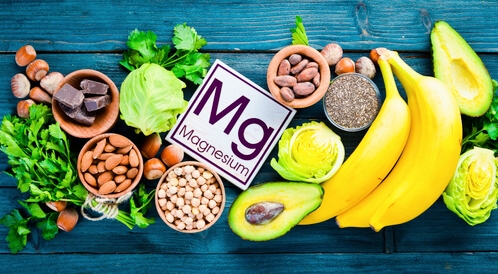Understanding Magnesium Deficiency: Symptoms and Dietary Solutions

Magnesium is crucial for more than 300 enzymatic reactions in the body, supporting muscle movement, stimulating nerve impulses, regulating blood sugar levels, and strengthening bones.
When magnesium intake decreases due to stress, poor diet, or certain medications, the body may send subtle yet significant warning signals, according to the Times of India.
* 9 Warning Signs of Magnesium Deficiency:
1. Muscle Cramps and Twitches:
These often occur in the legs or eyelids, as magnesium regulates muscle contractions. A deficiency can lead to involuntary contractions and difficulty relaxing muscles.
2. Persistent Fatigue Without Clear Cause:
A lack of magnesium hampers cellular energy production, resulting in feelings of exhaustion despite adequate rest.
3. Insomnia or Sleep Disturbances:
Magnesium influences melatonin and GABA, substances that calm the nervous system. A deficiency can lead to sleep issues, including vivid dreams or nighttime wakefulness.
4. Unexplained Anxiety or Nervousness:
Low magnesium levels can make the brain more sensitive to stress, potentially causing anxiety, mood swings, or sudden outbursts of anger, often mistaken for emotional exhaustion.
5. Irregular Heartbeat:
Magnesium is essential for electrical signals in the heart. A deficiency may manifest as palpitations or rapid heartbeat, especially in individuals with pre-existing heart conditions.
6. Weak Nails and Brittle Bones:
Magnesium aids calcium absorption, and a deficiency can result in weakened bones and nails, with these changes developing gradually over time.
7. Headaches and Migraines:
A magnesium deficiency can affect neurotransmitters and blood vessel contraction in the brain, leading to recurrent and sometimes severe headaches.
8. Tingling or Numbness in Extremities:
Nerves rely on magnesium, and a deficiency can cause tingling or numbness in the hands and feet due to weakened nerve impulses.
9. Strong Cravings for Sugar:
Low magnesium levels can impair insulin function, leading to sudden sugar cravings or significant blood sugar fluctuations, increasing the risk of prediabetes or insulin resistance over time.
* 5 Natural Foods to Combat Magnesium Deficiency:
1. Pumpkin Seeds:
A handful provides half of the daily magnesium requirement and is rich in healthy fats and antioxidants.
2. Spinach and Dark Leafy Greens:
Vegetables like kale and Swiss chard can be added to smoothies, soups, or cooked dishes to enhance magnesium intake.
3. Almonds and Cashews:
These nuts are excellent for maintaining nerve and heart health, being rich in magnesium, protein, and vitamin E.
4. Avocado:
High in magnesium and potassium, avocados help reduce muscle cramps and improve hydration.
5. Dark Chocolate:
A daily piece of chocolate with 70% cocoa or higher can boost mood, reduce inflammation, and increase magnesium levels.
A magnesium deficiency often manifests through common symptoms such as fatigue, cramps, and anxiety. However, simple dietary adjustments can help restore magnesium levels naturally. If symptoms persist despite lifestyle changes, it is advisable to consult a physician for a blood test.
